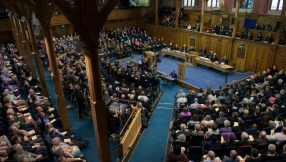The front of yesterday's Metro newspaper informed us that the 'Church advises schools: Let kids chose their gender', whilst less sensationalist reporting in the Guardian explains that 'Boys should be free to wear tutus and tiaras, says Church of England'. This news comes as updated guidance has been provided to the 4700 Church of England schools on 'Valuing All God's Children: Guidance on challenging homophobic, biphobic and transphobic bullying'. The guidance is concerned with preventing and responding to bullying in schools, where lesbian, gay, bisexual and trans* children and young people are at much greater risk of harm as a result of their sexual or gender identity. Research has found self-harm and suicide attempts amongst LGBT young people are extremely high, and many have appreciated the Church of England's efforts to prevent and respond to the serious challenges that LGBT children, young people and families face in education, and within wider society.

Whilst the majority of the document focuses on good practice around preventing and addressing bullying, the legal frameworks required and policy guidance for schools, the small section of the document which has been selectively quoted extensively in the media states (on page 20):
In the early years context and throughout primary school, play should be a hallmark of creative exploration. Pupils need to be ale to play with the many cloaks of identity (sometimes quite literally with the dressing up box). Children should be at liberty to explore who they might without judgement or derision. For example, a child may choose the tutu, princess's tiara and heels and/or the firefighter's helmet, tool belt and superhero cloak without expectation or comment. Childhood has a sacred space for creative self-imagining... It may be best to avoid labels and assumptions which deem children's behaviour irregular, abnormal or problematic just because it does not conform to gender stereotypes or today's play preferences.
As a gender justice specialist, I am delighted with any efforts to address gender stereotyping in the classroom, especially when so many teachers are trained to reinforce gender stereotypes, based on debunked neurosexist research. I have been a long-term supporter of the Let Toys Be Toys campaign which provides extensive (and free) education toolkits for abolishing gender stereotypes, and it is interesting that these resources from Let Toys Be Toys remain absent from the Church of England document. When delivering training around gender awareness and on topics such as domestic abuse, I find that it is often teachers who are most keenly committed to ideas of innate gender difference which requires boys and girls to be taught in different ways, even though psychologists like Cordelia Fine have delegitimised much of the science gender-differentiating teaching practice continues to be based on.
The efforts of the Church of England to address the high levels of bullying that lesbian, gay, bisexual and trans* children, young people and families face is commendable, however it is telling that the guidance around addressing gender stereotyping in schools is located within a policy for LGBT children, young people and families, as is their lack of engagement with the resources from Let Toys Be Toys.
Gender stereotypes harm everyone. When the harm is inferred to be limited to those with diverse gender or sexual identities, it reduces the efficacy of efforts to address the harm done. Suicide is the biggest killer of men under 45 years old; an issue directly linked to masculine socialisation which prevents men developing emotional literacy, admitting weakness or seeking help for their mental ill health. There has been a 68% rise in teenage girls self-harming. In recent weeks, hundreds of thousands of women have shared their stories on social media with the hashtag #metoo, highlighting the predatory sexual behaviour of so many men. It may seem like a big leap from restrictive gender stereotypes to sexual violence, but whilst girls are limited to sparkly pink princesses, caring, cooking and whilst boys are limited to aggression, anger, violence and superheroes, we continue to socialise our children into restrictive roles which see boys unable to express emotions and girls unable to assert themselves.
Whilst these socialising structures are deeply harmful to LGBT children, young people and families, they are also harmful to every child, every young person, every adult and the whole of society. It is a great start for the Church of England to address this within their guidance on challenging homophobic, biphobic and transphobic bullying, yet this should not be the end of their efforts. We need the abolition of gender stereotypes for all children, with training and education for teachers, teaching assistants, governing bodies and parents about the extreme harm gender stereotyping does to all children. Rather than addressing gender stereotypes within an LGBT bullying policy, which may lead some educators to see the issues as limited to gender and sexual identity concerns, we need to mainstream it across the whole of school life.
There is also a question of whether the Church of England's position is entirely cohesive. Creating school environments where children are not limited by gender stereotypes seems at odds with an organisation which continues to make provisions for those who refuse to accept the Church's views of the ordination of women. To tell children they can dress however they like whilst limiting the ministry of female priests seems rather incongruous; as does encouraging children to be non-judgemental about same sex relationships in a church which does not bless such relationships.
This guidance is a good start in creating Church of England schools which no longer limit children and young people through harmful gendered socialisation. However, it is only the first step in what must become a much more far reaching effort to change school culture, so that all children and young people can flourish.
Natalie Collins is a Gender Justice Specialist. She is the Director of the DAY Programme and works to enable individuals and organisations to prevent and respond to male violence against women. She is on Twitter: @God_loves_women













